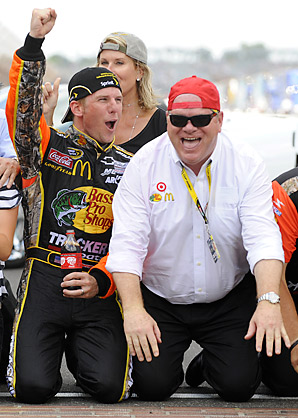The three best and worst moves in NASCAR this season
Yes, Kahne to Red Bull is the stuff of Redonkulous Season, but it's also the stuff of 2011. What about the monumental moves that have had a direct impact on this season? Herewith: a look at the three biggest hits and misses.
1. Kevin Harvick's power play. In July 2009, Harvick wouldn't even discuss the possibility of returning to Richard Childress Racing, threatening to leave when all four teams were struggling. Childress spent the offseason streamlining the operations, cutting back to three cars and insisting that developing faster cars be priority No. 1. Whether it was out of fear of losing Harvick or not is up for debate, but in the end Childress gave him exactly what he wanted: a team that can compete for a title, with Happy sitting atop the points standings. He re-upped with RCR and reportedly will become the new face of Budweiser after Kahne's deal runs out.
2. Steve Addington Joining Kurt Busch. Addington took the fall when Kyle Busch failed to make the Chase last season and Kurt gladly scooped up his brother's erstwhile crew chief. The partnership has resulted in two Cup wins (Atlanta and Charlotte) as well as a $1 million payday by claiming the All-Star Race. Addington had helped to keep Busch's emotions reined in -- for the most part -- and with Kurt sitting fourth with the Chase looming, he may be a darkhorse candidate to win the title.
3. Jamie McMurray to Ganassi. After being let go by Roush Fenway Racing, McMurray looked as if he were destined to become the next Casey Mears: a once-promising driver who fizzled. But signing McMurray has been the deftest move of the offseason, as he won at Daytona and Indianapolis and would have won at Talladega if not for a well-timed Harvick pass. He's a long shot to make the Chase, sitting 15th in the standings with four regular-season races to go, but he's clearly headed for stardom. Now, can he get an extension on that one-year deal?
1. Nos. 5 and 88 teams working together.Rick Hendrick made getting Dale Earnhardt Jr.'s disappointing run in the No. 88 turned around his top priority. Junior was paired with Mark Martin to share information, as well as a few key team members, with the hopes they could make both teams stronger. The partnership certainly started out well as both cars qualified on the front row at Daytona, but it's fizzled since, succeeding mostly in zapping Martin of the edge he had a year ago in finishing second in the points. Martin has rebounded to get himself back in Chase contention, while Junior has his work cut out for him to make the playoff. The intent was noble, but this move backfired in the worst way.
2. Matt Kenseth's crew chief merry-go-round. It's like Kenseth has turned his search for a crew chief into a reality dating show. First it was Drew Blickensderfer, who was fired after the Daytona 500 in favor of Todd Parrott, who lasted all of 15 races before he was cast off for Jimmy Fennig. Kenseth has been looking for his next Robbie Reiser ever since he left Kenseth's side to become Roush Fenway Racing general manager in 2007. If Kenseth is on track to make the Chase amid that chaos, wouldn't it stand to reason that you'd want to find a way to reunite him with the crew chief that could take him to the next level instead of having him try to manufacture chemistry on the fly? RFR is playing this situation all wrong.
3. The midseason spoiler switch. Count the Racing Fan in the camp that believes the spoiler looks cosmetically better than the wing, but did we really have to make the switch during the season? The NBA at least realized its midseason move to a synthetic ball in 2005 was a mistake, and while I'm not saying we should be moving back to the wing, it's like telling competitors midway through a half marathon that they're all going to have to be required to run 26.2 miles instead. NASCAR scored big with most of its rule changes, especially the multiple green-white checkered restarts, but the manner in which they moved to the spoiler left something to be desired and it took the field more than half a season to figure everything out with the new setups.
9 -- David Pearson's career wins at Michigan, the most all-time.
$139,720 -- Pearson's total winnings in those victories.
$180,219 -- Jeff Gordon's average winnings in two wins at MIS.
Carl Edwards. Roush Fenway has been steadily growing better by the week, and while Greg Biffle was the first to reach Victory Lane at Pocono, Edwards has been the posterboy of their late-season turnaround, rattling off five straight top 10s. He's a strong bet to end his 58-race drought in Brooklyn, Mich., where he has two career wins and has finished outside the top five just twice in the last 11 races.





